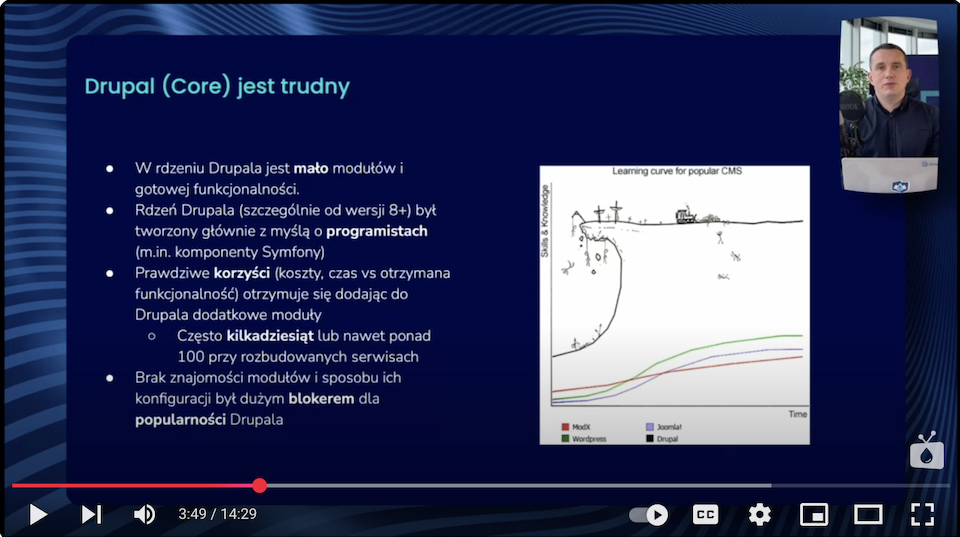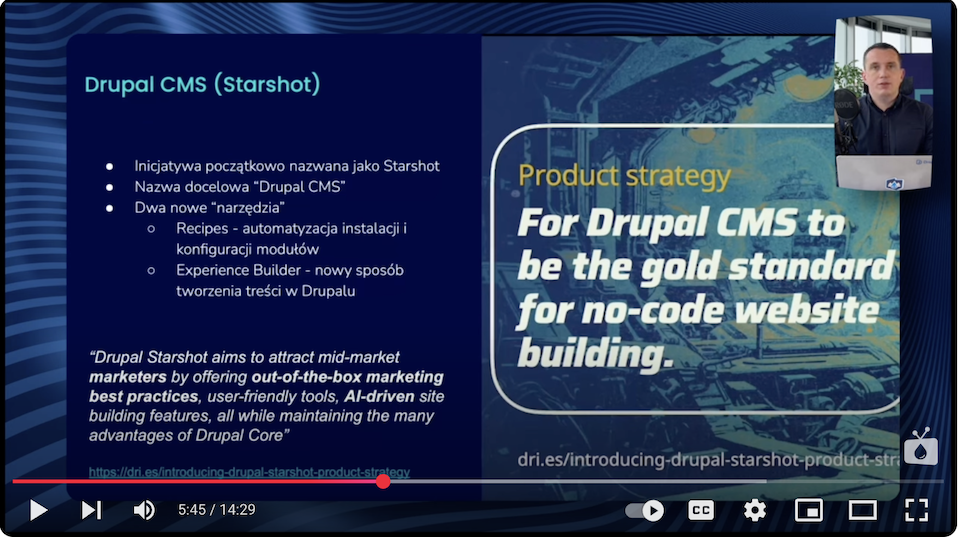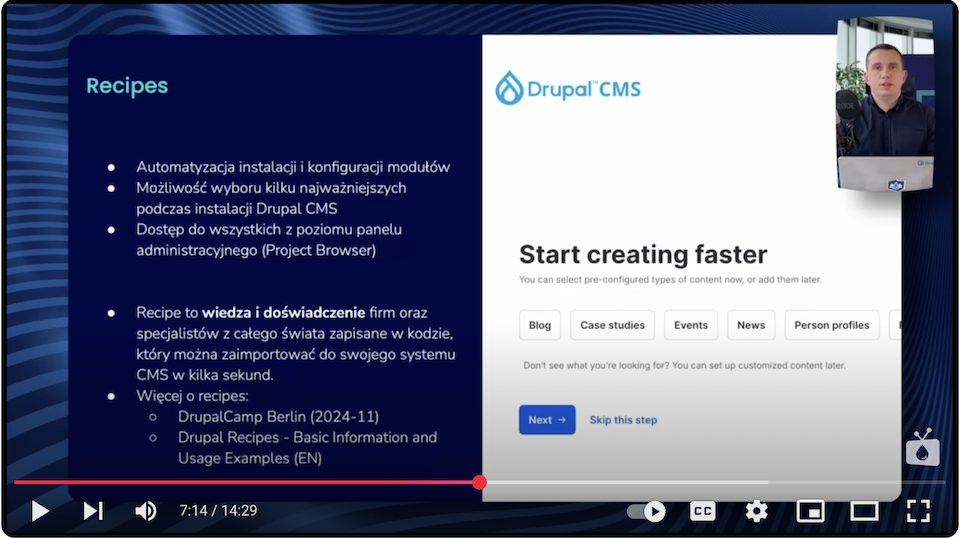
Drupal CMS vs. Drupal Core – Key Differences and How to Choose a System
At the beginning of 2025, a new CMS hit the market that could revolutionize how you can manage content online. We mean Drupal CMS, a platform designed primarily for marketers that offers intuitive tools for creating websites without coding. What sets this project apart? What capabilities does it offer, and how does it differ from the Drupal Core? We encourage you to read the article or watch an episode of the “Nowoczesny Drupal” series.
Drupal's history and development
Drupal is one of the oldest content management systems, and it was developed in 2001. Since then, it has undergone numerous modifications and improvements, becoming one of the most popular open-source tools for building websites.
One of the key milestones in the system's development was the release of Drupal 8 in 2015. It introduced a modern architecture based on components of the Symfony framework, which allowed for better code organization and facilitated the development of new functionalities. It was from this version that the system began to be called modern Drupal.
Drupal has adopted a cyclic release strategy, meaning that new versions are released every six months. The current latest versions are Drupal 10.4 (released on December 17, 2024) and Drupal 11.1 (released on December 16, 2024).

It's worth noting that versions of the Drupal 10 family will be supported until 2026, giving administrators and developers three years to migrate to version 11. That's a much longer transition period than the more complicated and laborious migration from Drupal 7 to Drupal 8.
Over the years, Drupal has gained a reputation as a powerful tool but also as a complicated system for those without technical knowledge. With versions 10 and 11, steps were taken to simplify the user experience and implement modern technologies, which allowed the creation of a new project - Drupal CMS, based on Drupal Core.
Drupal Core - the foundation of the system
Drupal Core is the heart of the Drupal system, consisting of basic modules and features. It includes tools for managing content, taxonomy, categories, users, and menus. In addition, it provides features for developers to create additional modules that extend Drupal's capabilities.

One of the key aspects of Drupal Core is its modularity - on its own, it contains relatively little ready-made functionality. Those who install Drupal Core may feel that the system "has nothing" since it was created with specialized programmers in mind, creating, among other things, the powerhouse of the system - modules.
As a result, Drupal Core doesn’t require code modifications to customize the system. All changes and customizations can be implemented through additional modules, ensuring stability and easy updates. In practice, every feature can be customized or overridden, giving you excellent configuration freedom.
Drupal CMS - the new standard for marketers
Drupal CMS is a new version of Drupal, which was developed as a CMS system for marketing teams and content creators to simplify the process of managing websites. It's not a completely new system - it's based on Drupal Core, but it includes a ready-made configuration and pre-installed modules that make it easier to use, especially for those without programming skills.

The inspiration for this approach was to simplify the Drupal ecosystem so that users don't have to search for and install modules on their own. This can be compared to a Linux distribution - Drupal Core is like the kernel of the system, and Drupal CMS is a ready-made distribution, similar to Ubuntu, where the user gets a set of ready-to-use tools.
Drupal CMS was developed as part of the Drupal Starshot initiative, which aimed to make Drupal simpler and more accessible. The main idea is to create a system that works with a no-code approach, meaning that users can build and manage websites without programming.
The backbone of Drupal CMS is two new tools:
- Drupal Recipes - a mechanism for quick installation and configuration of modules. Thus, instead of manually configuring the system, users can import ready-made settings and functionalities in seconds. Recipes save the knowledge of Drupal specialists in the form of code, which can be easily imported into any installation.

- Experience Builder - a new content editor that combines the best features of Paragraphs and Layout Builder modules. It allows you to create and edit pages in visual mode, which greatly facilitates the work of non-technical people.

Drupal CMS will be developed at a rapid pace - new versions of the system will be released every three months. The official version 1.0 was released on January 15, 2025. The planned release of Experience Builder will take place in the third quarter of 2025, which will renumber the system to version 2.0.
In summary, Drupal CMS is a modern, easier-to-use version of Drupal that allows you to quickly deploy websites, eliminating the need for deep knowledge of the system. With features such as Recipes and Experience Builder, it’s poised to become a breakthrough tool for marketers and companies looking for a flexible but user-friendly CMS.
Which system to choose: Drupal CMS or Drupal Core?
As you can see, there are currently two Drupal systems that have slightly different applications. Which one would be a better choice for your organization?
Drupal CMS is for you if:
- You’re a marketer and want to create websites without coding.
- You have a budget of 50K to 200K to launch the website.
- You want to quickly implement off-the-shelf solutions.
- You work in an agency serving clients with limited budgets.
Drupal Core is for you if:
- You have programmers or IT professionals on your team.
- You need a high degree of system customization for your needs.
- You create elaborate projects (e.g., intranet systems or corporate portals) with budgets over 200K.
Drupal CMS versus Drupal Core - summary
Drupal Core remains the choice for web development. It will work great when you have developers on your team and stringent and extensive specifications for your project. On the other hand, Drupal CMS is a modern CMS that will revolutionize the way you manage content. Its main advantages are ease of use, quick installation of functionality thanks to Recipes, and a smart content editor, Experience Builder. This will make the system an attractive option for marketers and agencies looking for effective and easy-to-use website management tools.
If you want to learn more about Drupal CMS, check out the official documentation or contact the experts at Drupal agency to customize the system for your business.











